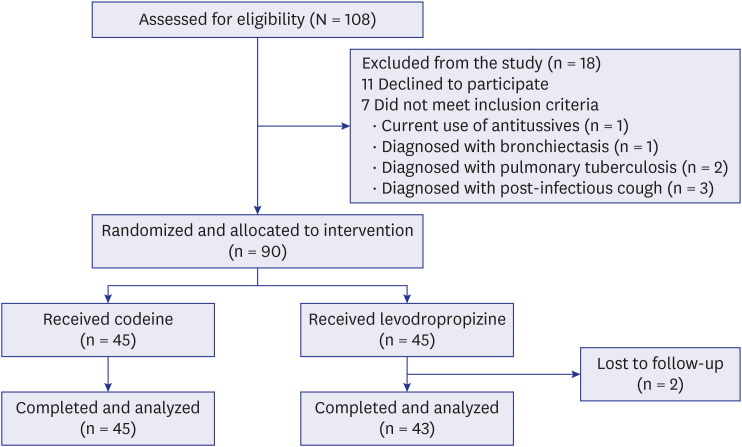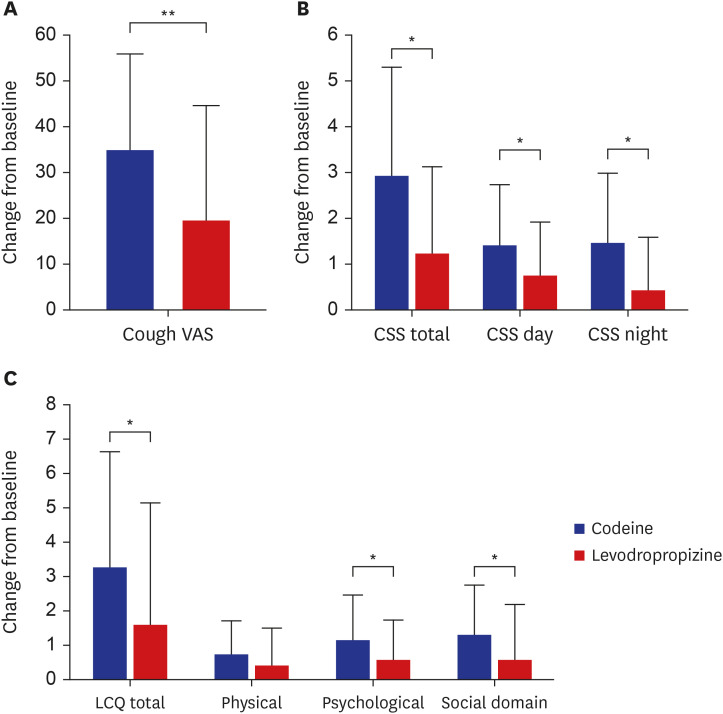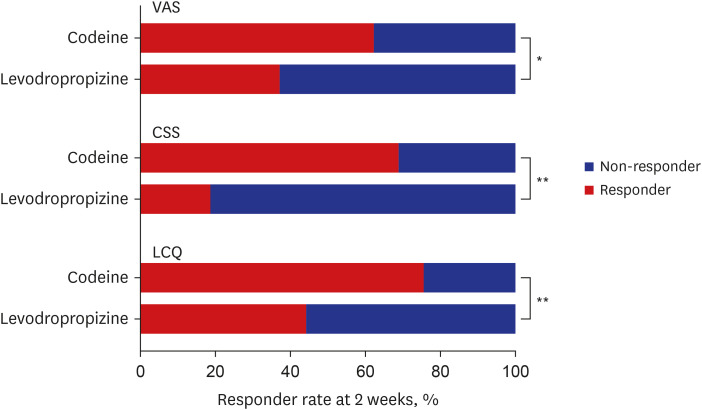J Korean Med Sci.
2022 Sep;37(36):e275. 10.3346/jkms.2022.37.e275.
Effectiveness and Safety of Codeine and Levodropropizine in Patients With Chronic Cough
- Affiliations
-
- 1Department of Internal Medicine, Gachon University Gil Medical Center, Incheon, Korea
- 2Division of Allergy, Department of Medicine, Samsung Medical Center, Sungkyunkwan University School of Medicine, Seoul, Korea
- KMID: 2533230
- DOI: http://doi.org/10.3346/jkms.2022.37.e275
Abstract
- Background
Recent progress in chronic cough management includes controlling cough triggers and hypersensitivity using antitussives. Therefore, we investigated the effects and safety outcomes of antitussives, codeine and levodropropizine, in patients with chronic cough.
Methods
We conducted an open-label, randomized comparative trial with newly referred patients with chronic cough. Patients were orally administered codeine (60 mg/day) and levodropropizine (180 mg/day) for 2 weeks. Cough severity, including the visual analog scale (VAS), Cough Symptom Score (CSS), Leicester Cough Questionnaire (LCQ), and safety for each treatment were assessed. The primary outcome was VAS score changes before and after 2 weeks of treatment.
Results
Among the 88 participants, 45 and 43 in the codeine and levodropropizine groups, respectively, were included in the analysis. Changes in the VAS score were higher in the codeine group than in the levodropropizine group (35.11 ± 20.74 vs. 19.77 ± 24.83, P = 0.002). Patients administered codeine also had improved CSS (2.96 ± 2.35 vs. 1.26 ± 1.89, P < 0.001) and LCQ (3.28 ± 3.36 vs. 1.61 ± 3.53, P = 0.025) than those administered levodropropizine. Treatment-related adverse events, including drowsiness, constipation, and headaches, were more frequent in the codeine group than in the levodropropizine group. However, no significant differences existed in the adverse events leading to discontinuation.
Conclusion
Codeine is an effective and generally well-tolerated antitussive for chronic cough. However, it may induce side effects in some patients. Individual responses and adverse events should be carefully monitored when codeine is used to treat chronic cough.
Figure
Reference
-
1. Lee JH, Kang SY, Yoo Y, An J, Park SY, Lee JH, et al. Epidemiology of adult chronic cough: disease burden, regional issues, and recent findings. Asia Pac Allergy. 2021; 11(4):e38. PMID: 34786368.
Article2. Morice AH, Millqvist E, Belvisi MG, Bieksiene K, Birring SS, Chung KF, et al. Expert opinion on the cough hypersensitivity syndrome in respiratory medicine. Eur Respir J. 2014; 44(5):1132–1148. PMID: 25142479.
Article3. Song WJ, Chung KF. Exploring the clinical relevance of cough hypersensitivity syndrome. Expert Rev Respir Med. 2020; 14(3):275–284. PMID: 31914340.
Article4. Song WJ, An J, McGarvey L. Recent progress in the management of chronic cough. Korean J Intern Med. 2020; 35(4):811–822. PMID: 32422697.
Article5. Morice AH, Millqvist E, Bieksiene K, Birring SS, Dicpinigaitis P, Domingo Ribas C, et al. ERS guidelines on the diagnosis and treatment of chronic cough in adults and children. Eur Respir J. 2020; 55(1):1901136. PMID: 31515408.
Article6. Eddy NB, Friebel H, Hahn KJ, Halbach H. Codeine and its alternates for pain and cough relief. 3. The antitussive action of codeine--mechanism, methodology and evaluation. Bull World Health Organ. 1969; 40(3):425–454. PMID: 4896168.7. Dicpinigaitis PV, Morice AH, Birring SS, McGarvey L, Smith JA, Canning BJ, et al. Antitussive drugs--past, present, and future. Pharmacol Rev. 2014; 66(2):468–512. PMID: 24671376.
Article8. Zanasi A, Lanata L, Fontana G, Saibene F, Dicpinigaitis P, De Blasio F. Levodropropizine for treating cough in adult and children: a meta-analysis of published studies. Multidiscip Respir Med. 2015; 10(1):19. PMID: 26097707.
Article9. Yancy WS Jr, McCrory DC, Coeytaux RR, Schmit KM, Kemper AR, Goode A, et al. Efficacy and tolerability of treatments for chronic cough: a systematic review and meta-analysis. Chest. 2013; 144(6):1827–1838. PMID: 23928798.
Article10. Song DJ, Song WJ, Kwon JW, Kim GW, Kim MA, Kim MY, et al. KAAACI evidence-based clinical practice guidelines for chronic cough in adults and children in Korea. Allergy Asthma Immunol Res. 2018; 10(6):591–613. PMID: 30306744.
Article11. Sato S, Saito J, Sato Y, Ishii T, Xintao W, Tanino Y, et al. Clinical usefulness of fractional exhaled nitric oxide for diagnosing prolonged cough. Respir Med. 2008; 102(10):1452–1459. PMID: 18614345.
Article12. Oh MJ, Lee JY, Lee BJ, Choi DC. Exhaled nitric oxide measurement is useful for the exclusion of nonasthmatic eosinophilic bronchitis in patients with chronic cough. Chest. 2008; 134(5):990–995. PMID: 18583518.
Article13. Kwon JW, Moon JY, Kim SH, Song WJ, Kim MH, Kang MG, et al. Korean version of the Cough Symptom Score: clinical utility and validity for chronic cough. Korean J Intern Med. 2017; 32(5):910–915. PMID: 28352059.
Article14. Kwon JW, Moon JY, Kim SH, Song WJ, Kim MH, Kang MG, et al. Reliability and validity of a Korean version of the Leicester Cough Questionnaire. Allergy Asthma Immunol Res. 2015; 7(3):230–233. PMID: 25749761.
Article15. Birring SS, Prudon B, Carr AJ, Singh SJ, Morgan MD, Pavord ID. Development of a symptom specific health status measure for patients with chronic cough: Leicester Cough Questionnaire (LCQ). Thorax. 2003; 58(4):339–343. PMID: 12668799.
Article16. Hsu JY, Stone RA, Logan-Sinclair RB, Worsdell M, Busst CM, Chung KF. Coughing frequency in patients with persistent cough: assessment using a 24 hour ambulatory recorder. Eur Respir J. 1994; 7(7):1246–1253. PMID: 7925902.
Article17. Martin Nguyen A, Bacci ED, Vernon M, Birring SS, Rosa C, Muccino D, et al. Validation of a visual analog scale for assessing cough severity in patients with chronic cough. Ther Adv Respir Dis. 2021; 15:17534666211049743. PMID: 34697975.
Article18. Spinou A, Birring SS. An update on measurement and monitoring of cough: what are the important study endpoints? J Thorac Dis. 2014; 6(Suppl 7):S728–S734. PMID: 25383207.19. Raj AA, Pavord DI, Birring SS. Clinical cough IV:what is the minimal important difference for the Leicester Cough Questionnaire? Handb Exp Pharmacol. 2009; 187(187):311–320.
Article20. Trescot AM, Datta S, Lee M, Hansen H. Opioid pharmacology. Pain Physician. 2008; 11(2):Suppl. S133–S153. PMID: 18443637.
Article21. Morice AH, Menon MS, Mulrennan SA, Everett CF, Wright C, Jackson J, et al. Opiate therapy in chronic cough. Am J Respir Crit Care Med. 2007; 175(4):312–315. PMID: 17122382.
Article22. Singu B, Verbeeck RK. Should codeine still be considered a WHO essential medicine? J Pharm Pharm Sci. 2021; 24:329–335. PMID: 34192509.
Article23. Gaedigk A, Sangkuhl K, Whirl-Carrillo M, Klein T, Leeder JS. Prediction of CYP2D6 phenotype from genotype across world populations. Genet Med. 2017; 19(1):69–76. PMID: 27388693.
Article24. Luporini G, Barni S, Marchi E, Daffonchio L. Efficacy and safety of levodropropizine and dihydrocodeine on nonproductive cough in primary and metastatic lung cancer. Eur Respir J. 1998; 12(1):97–101. PMID: 9701421.
Article25. James A, Williams J. Basic opioid pharmacology - an update. Br J Pain. 2020; 14(2):115–121. PMID: 32537150.
Article26. Smith JA, Badri H. Cough: new pharmacology. J Allergy Clin Immunol Pract. 2019; 7(6):1731–1738. PMID: 31279461.
Article27. Roe NA, Lundy FT, Litherland GJ, McGarvey LP. Therapeutic targets for the treatment of chronic cough. Curr Otorhinolaryngol Rep. 2019; 7(2):116–128.
Article28. Abdulqawi R, Dockry R, Holt K, Layton G, McCarthy BG, Ford AP, et al. P2X3 receptor antagonist (AF-219) in refractory chronic cough: a randomised, double-blind, placebo-controlled phase 2 study. Lancet. 2015; 385(9974):1198–1205. PMID: 25467586.
- Full Text Links
- Actions
-
Cited
- CITED
-
- Close
- Share
- Similar articles
-
- The Efficacy of Inhaled Corticosteroid on Chronic Idiopathic Cough
- Levodropropizine-Induced Anaphylaxis: Case Series and Literature Review
- A Case of Codeine Induced Anaphylaxis via Oral Route
- Airway disorders associated with chronic cough
- Pharmacokinetics and Safety of Levodropropizine Controlled Release Tablet after Repeated Dosing in Healthy Male Volunteers




